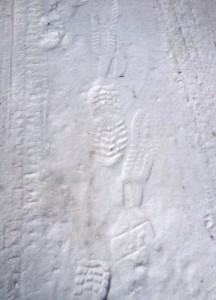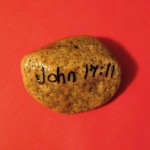 Our dog Jack has always been a winter dog, and despite him being the doggy-equivalent of 80 years, he can still romp like a puppy when he’s out in the snow. Today while walking him, it struck me that I’ve memorized the various boot-prints of neighbors who are also out dog-walking each day. (Even when it’s fifteen-below, dogs must be walked!)
Our dog Jack has always been a winter dog, and despite him being the doggy-equivalent of 80 years, he can still romp like a puppy when he’s out in the snow. Today while walking him, it struck me that I’ve memorized the various boot-prints of neighbors who are also out dog-walking each day. (Even when it’s fifteen-below, dogs must be walked!)
These days snow boots have all manner of “grid” on their soles, and though I don’t know which person’s prints belong to who, I do see the same patterns in the snow day after day. There are the feet with circle-prints, others with squiggly lines , some with tire-like treads, and one with a sunburst pattern. Although I rarely run into another person while walking Jack, the variety of footprints in the snow testifies to each one having been there.
All of us leave evidence in places we’ve been. Sometimes it’s negative, like when a child fixes a snack and walks away from a messy kitchen. Other times it’s positive, like when my sister hides a Scripture rock for me to find later. Even though she’s long gone when I discover it, her thoughtful persona lingers.
When we look at the verses in Scripture that describe situations where Jesus had just been, we see an interesting consistency.
 He left people jumping up and down with joy, or shouting praises to God, or standing speechless and overcome with wonder. He left changed lives in his wake.
He left people jumping up and down with joy, or shouting praises to God, or standing speechless and overcome with wonder. He left changed lives in his wake.
How often do I enter a home or other gathering place with any thought to my exit strategy? Since I often have regrets after leaving (should have, would have, could have), apparently not often enough. But it’s not only that.
On those rare occasions when I have left something positive in my wake, it hasn’t always been with sterling motives. Was my goal to remind them of how wonderful I was while I was with them? Or have I tried to leave behind an awareness that a Christ-follower was there? Honestly, my answers aren’t usually good ones.
But Jesus is a perfect tutor on this. He repeatedly modeled the right way to do it, often saying that everything he did was meant to leave behind an accurate impression of God his Father and of his relationship with him as a Son. In Hebrews we read, “The Son is the radiance of God’s glory and the exact representation of his being.” (1:3) A radiance is a glow that lingers, and Jesus passionately wanted us to remember him as the portrayal of a God who desires a personal love relationship with us.
None of us can do as well as Jesus, but wisdom should keep us working at it. Does this mean my pockets should be stuffed with Scripture rocks?
 Actually, that’s not a bad idea.
Actually, that’s not a bad idea.
Jesus said, “I do as the Father has commanded me, so that the world may know that I love the Father.” (John 14:31)






